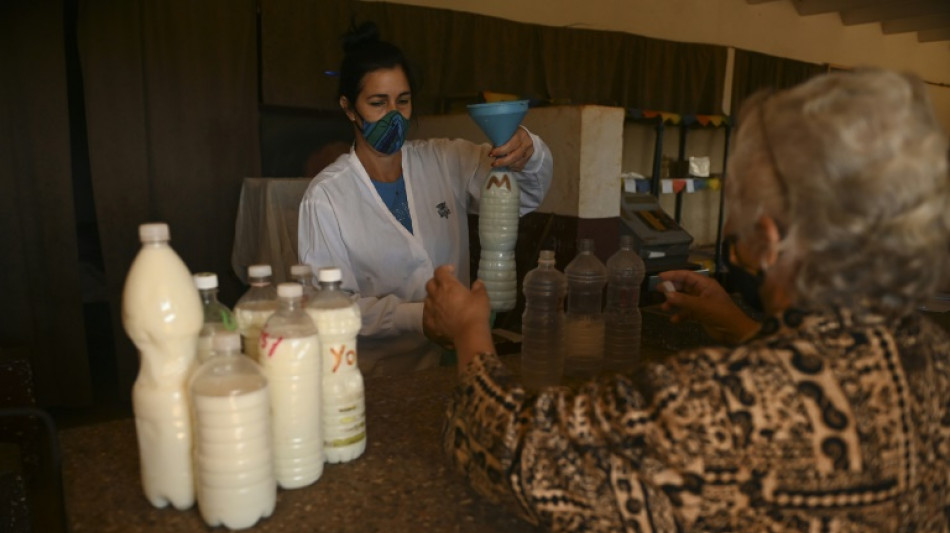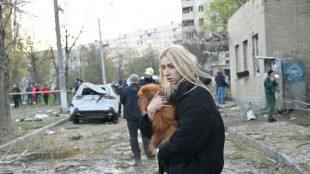
-
 SFWJ / Medcana Announces Strategic Expansion Into Australia With Acquisition of Cannabis Import and Distribution Licenses
SFWJ / Medcana Announces Strategic Expansion Into Australia With Acquisition of Cannabis Import and Distribution Licenses
-
Maresca confident he will survive Chelsea slump

-
 Mob beats to death man from persecuted Pakistan minority
Mob beats to death man from persecuted Pakistan minority
-
Lebanon says one killed in Israeli strike near Sidon

-
 Arsenal's Havertz could return for Champions League final
Arsenal's Havertz could return for Champions League final
-
US officials split on Ukraine truce prospects

-
 Client brain-dead after Paris cryotherapy session goes wrong
Client brain-dead after Paris cryotherapy session goes wrong
-
Flick demands answers from La Liga for 'joke' schedule

-
 'Maddest game' sums up Man Utd career for Maguire
'Maddest game' sums up Man Utd career for Maguire
-
Trial opens for students, journalists over Istanbul protests

-
 Gaza rescuers say Israeli strikes kill 24 after Hamas rejects truce proposal
Gaza rescuers say Israeli strikes kill 24 after Hamas rejects truce proposal
-
'Really stuck': Ukraine's EU accession drive stumbles

-
 'Not the time to discuss future', says Alonso amid Real Madrid links
'Not the time to discuss future', says Alonso amid Real Madrid links
-
74 killed in deadliest US attack on Yemen, Huthis say

-
 Southgate's ex-assistant Holland fired by Japan's Yokohama
Southgate's ex-assistant Holland fired by Japan's Yokohama
-
Vance meets Meloni in Rome before Easter at the Vatican

-
 Ryan Gosling to star in new 'Star Wars' film
Ryan Gosling to star in new 'Star Wars' film
-
Hamas calls for pressure to end Israel's aid block on Gaza

-
 Russia says Ukraine energy truce over, US mulls peace talks exit
Russia says Ukraine energy truce over, US mulls peace talks exit
-
58 killed in deadliest US strike on Yemen, Huthis say

-
 Museums rethink how the Holocaust should be shown
Museums rethink how the Holocaust should be shown
-
Three dead after deadly spring storm wreaks havoc in the Alps

-
 No need for big changes at Liverpool, says Slot
No need for big changes at Liverpool, says Slot
-
Bloody Philippine passion play sees final performance of veteran 'Jesus'

-
 New US envoy prays, delivers Trump 'peace' message at Western Wall
New US envoy prays, delivers Trump 'peace' message at Western Wall
-
Postecoglou sticking around 'a little longer' as Spurs show fight in Frankfurt

-
 US threatens to withdraw from Ukraine talks if no progress
US threatens to withdraw from Ukraine talks if no progress
-
Tears and defiance in Sumy as Russia batters Ukraine border city

-
 Russia rains missiles on Ukraine as US mulls ending truce efforts
Russia rains missiles on Ukraine as US mulls ending truce efforts
-
Tokyo leads gains in most Asian markets on trade deal hopes

-
 Two missing after deadly spring snowstorm wreaks havoc in the Alps
Two missing after deadly spring snowstorm wreaks havoc in the Alps
-
'War has taken everything': AFP reporter returns home to Khartoum

-
 US strikes on Yemen fuel port kill 38, Huthis say
US strikes on Yemen fuel port kill 38, Huthis say
-
Slegers targets Lyon scalp in pursuit of Arsenal European glory

-
 'Defend ourselves': Refugee girls in Kenya find strength in taekwondo
'Defend ourselves': Refugee girls in Kenya find strength in taekwondo
-
China's manufacturing backbone feels Trump trade war pinch

-
 Sri Lankans throng to Kandy for rare display of Buddhist relic
Sri Lankans throng to Kandy for rare display of Buddhist relic
-
Chinese vent anger at Trump's trade war with memes, mockery

-
 Heartbroken Brits abandon pets as living costs bite
Heartbroken Brits abandon pets as living costs bite
-
Mongolian LGBTQ youth fight for recognition through music, comedy

-
 Cash crunch leaves Syrians queueing for hours to collect salaries
Cash crunch leaves Syrians queueing for hours to collect salaries
-
Lyon left to regroup for Champions League bid after painful European exit

-
 Unravelling Real Madrid face Athletic Bilbao Liga test
Unravelling Real Madrid face Athletic Bilbao Liga test
-
Napoli disturbing buoyant Inter's peace in Serie A Easter bonanza

-
 Disappointed Dortmund chase consistency with Europe at stake
Disappointed Dortmund chase consistency with Europe at stake
-
Asian markets mixed as traders track tariff talks

-
 Yan and Buhai share lead at LA Championship
Yan and Buhai share lead at LA Championship
-
Under fire at debate, Canada PM Carney tries to focus on Trump

-
 Liverpool poised for Premier League coronation, Leicester, Ipswich for relegation
Liverpool poised for Premier League coronation, Leicester, Ipswich for relegation
-
India's elephant warning system tackles deadly conflict


Cuba runs out of milk, breaking Castro's promise
In the early days of communism in Cuba, Fidel Castro had pledged that every child under seven would have a liter of subsidized milk every day.
For some time, they did -- but today, many go without.
To circumvent the US embargo against Cuba and lagging domestic production, milk has to come from the other side of the world in an obstacle race that deprives many on the island of the staple.
Regla Caridad Zayas, a 59-year-old diabetic, said the milk powder that the Cuban state supplies monthly to her and others with special dietary needs dried up months ago.
She is supposed to get a kilo of powder, which makes 10 liters (2.6 gallons) of milk, every month.
Sitting at a rickety table from which she sells coffee outside her house, Zayas said the bodegas, or subsidized food stores, no longer carry the commodity.
In the supermarket, it is also nigh impossible to find: milk has become the latest casualty in a long history of chronic food shortages in Cuba, which on Monday marks six decades of US sanctions.
And it will continue to be in short supply in Havana and four other provinces, due to a lack of "financing, boats and suppliers," Internal Trade Minister Betsy Diaz said in October.
To find milk powder, Cuba looks all the way to New Zealand -- its main supplier with 18,470 tons in 2020 -- as well as Belgium (6,628 tons) and Uruguay (3,695 tons), according to specialized export and import data site Trade Map.
- Containers stuck -
Official Cuban data shows that the island produced 455 million kilograms of fresh milk in 2020, far short of what it needs.
According to the PanAmerican Dairy Federation, each person should have access to 150 liters of milk per year -- some 1.6 billion liters, and about the same in kilograms, for Cuba's 11.2 million inhabitants.
The cheapest and easiest would be to get the milk from the United States -- one of the world's largest exporters and less than 200 kilometers (124 miles) from Cuba's coastline.
Since 2000, food products have been excluded from the US embargo on trade with Havana. But Cuba must pay cash and in advance -- onerous conditions for a country in deep economic crisis, with little foreign exchange and no access to loans.
Getting products from the other side of the planet is not easy, either: more than 10,000 containers of food and other products were stuck last month in ports around the world due to pandemic supply chain issues, the government said.
For decades, revolutionary leader-turned-president Fidel Castro made a point of supplying cheap, subsidized milk to all children under the age of seven and people with chronic diseases.
His brother and successor Raul proposed in 2007 to go even further by "producing milk so that all those who want to drink a glass of milk can do it."
But today, even the guaranteed monthly ration of three kilos of powdered milk for children is running out. For other recipients such as Zayas, there is none.
- Milk was 'sacrosanct' -
"Truly, everything is disappearing," said Claudia Coronado, a 29-year-old mother of two children aged three and seven, while standing in one of Havana's ubiquitous food queues.
"We were used to not having chicken for a month, but milk, that was always sacrosanct."
"I have a daughter of eight, she's no longer getting milk," said Jenny Mora, 29, who said she often has no choice but to turn to the black market and pay exorbitant prices.
The store outside of which the two women are queuing only accepts foreign currency -- itself also only available on the parallel market.
A sachet of one kilogram (two pounds) of milk powder costs $6.30 -- a fortune in a country where the average monthly salary is $163.
Economist Omar Everleny Perez said that without government help, it was more profitable for farmers to sell their product on the black market.
- Lean cow, low yield -
Farmer Domingo Diaz, 79, blames the US embargo for "about 90 percent" of the milk shortage.
He blames the communist government for the rest.
Though it raised the purchase price to help producers, the government did nothing to secure access to cow feed, he said.
Undernourished, the animals produce very little.
"The milk problem affects everyone, it drives me mad, too," said Diaz, as he tried to squeeze milk from a lean beast.
Y.Aukaiv--AMWN